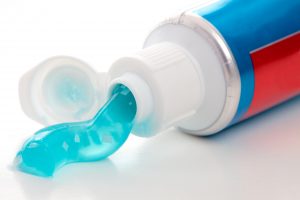 Good oral hygiene is a habit that can be easily overlooked, but that doesn’t mean it is any less important for you. The twice daily brushing (plus flossing) regimen keeps tooth decay and gum disease at bay.
Good oral hygiene is a habit that can be easily overlooked, but that doesn’t mean it is any less important for you. The twice daily brushing (plus flossing) regimen keeps tooth decay and gum disease at bay.
Or so we’d like to believe. But since when did brushing your teeth become dangerous to your health?
Advertisement
A report by the U.S. Food and Drug Administration (FDA) has shown that depending on the type of toothpaste we use, we may also be upping our risk of cancer.
Colgate has come under fire for the use of the controversial antibacterial chemical, triclosan, in its bestselling Colgate Total toothpaste. Triclosan is used in a variety of other products, including toys and cutting boards, but it’s most common in items for personal hygiene. The FDA estimates the chemical can be found in 75 percent of antibacterial liquid soaps and body washes sold in the United States.
RELATED READING: Why it’s so important to keep your cholesterol in check
The concern is information has come to light that links triclosan to cancer in animal studies. As Bloomberg reported, the FDA approved Colgate Total as an over-the-counter drug in 1997, but 35 key pages from the company’s application for product approval were not made public until recently. A Freedom of Information Act lawsuit was filed by a health advocacy group and the report was posted on the FDA website.
Those pages summarized studies showing fetal bone malformations in mice and rats, which suggests that triclosan causes hormonal disruptions linked to cancer cell growth.
So what are we putting in our mouths to brush every day? Or using on our hands and bodies as a deadly cleanser?
According to Bloomberg, Colgate at the time dismissed those studies as irrelevant to the application – and its own study on children and adults showed no harmful effects in small doses. Colgate still stands behind triclosan for its effectiveness to fight gum disease. It is the only toothpaste containing triclosan approved for sale in the U.S.
Push for triclosan ban
Though commonly used, triclosan was banned in many products by Minnesota earlier this year. The FDA is reviewing triclosan in hand soaps though not in Colgate Total, says Sandra Kweder, deputy director of the agency’s Office of New Drugs. While triclosan hasn’t been proven superior to soap and water at washing hands, she says, its benefit as an active ingredient in toothpaste was made clear through its FDA approval process, Bloomberg reports.
RELATED READING: This everyday food helps fight the war on cancer
Move away from controversial chemical
Colgate no longer uses triclosan in its Softsoap and Palmolive dish soaps, and competitors Johnson & Johnson and Procter & Gamble Co. are phasing out the chemical in their own products.
Meanwhile, the FDA and the Environmental Protection Agency both list triclosan as safe for human health.
Advertisement
But I’m inclined to be wary. There are an estimated 1,000 different chemicals we may be exposed to that can disrupt our body’s endocrine system. That’s where our glands produce the hormones that control our cells and organs, so messing with this system is putting your life in danger.
Triclosan is one of about 10 chemicals that people are exposed to on a regular basis, given the number of products where you’ll find it. It’s that small “insignificant” exposure that adds up over time. And if studies suggest a possible deadly effect on animals, than I think we’re taking a risk.
Related Reading: Chew on this to get rid of cavities
